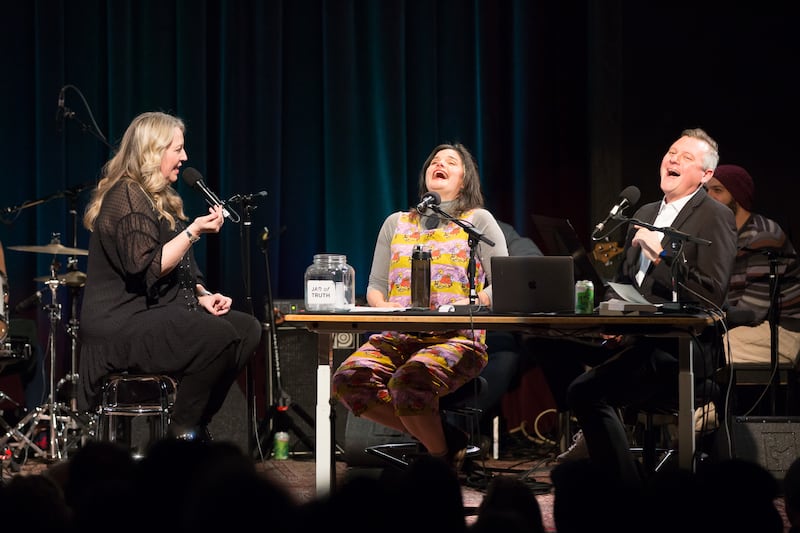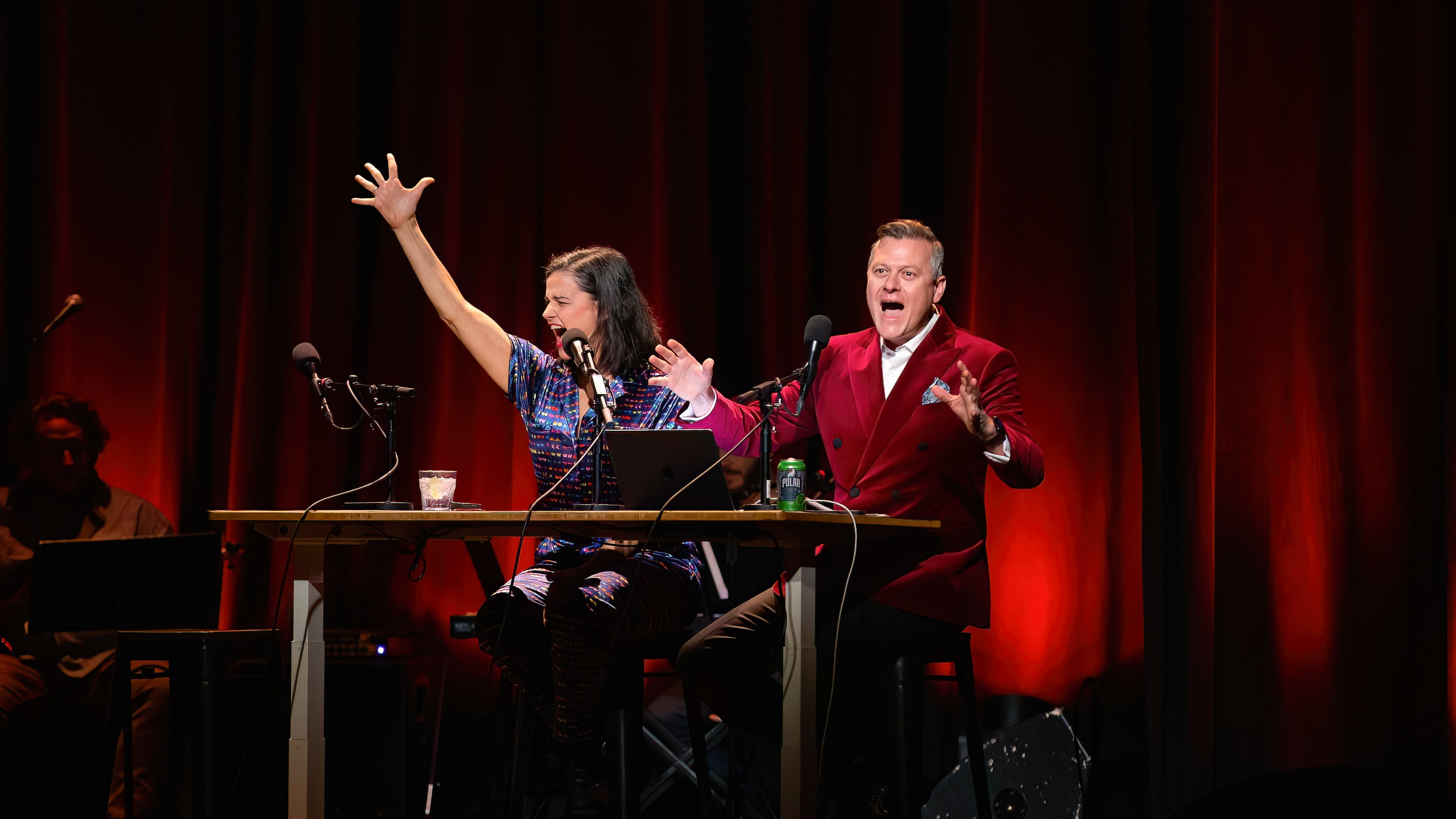Live Wire—Portland’s beloved homegrown public radio variety show—is almost old enough to order a drink from the Alberta Rose Theatre bar.
The show’s 20th anniversary season kicked off on a cold and drizzly night in mid-February at the Northeast Portland venue. The house band played a Dua Lipa song, and then host Luke Burbank and announcer Elena Passarello took the stage. Burbank wore a gray suit, white sneakers, and a boutonnière made of a pink carnation he shamelessly nabbed from a bouquet in the lobby.
“I’m surprised when someone in Portland hasn’t heard of Live Wire. One, because of my runaway ego,” Burbank told WW with his trademark self-deprecating humor. “But also there’s a national syndicated variety show made here in Portland that hundreds of thousands of people hear on the radio.”
That night, the four guests kept the audience off-balance in typical Live Wire fashion.
First, New York author Sloane Crosley took the stage (bespectacled, brilliant, all Manhattan literati cool) to promote her sixth book, Grief Is for People. The conversation was provocative (“the title is intentionally blunt, and I don’t think it’s true,” Crosley said) and dark, as her book is a memoir largely about the suicide of her closest friend.
Also in the lineup that night: writer and comedian Moshe Kasher on his new book, Subculture Vulture; local indie-pop band Glitterfox (one of WW’s Best New Bands in 2022) with killer performances of the singles “TV” and “La da da”; and WW’s reigning Portland’s Funniest Person Mx. Dahlia Belle with a tight, feline-focused set.
The pleasurable whiplash from such a diverse slate of guests, tones and topics is a signature feature of Live Wire (see “Luke Burbank’s Top 5 Guests”). The show hosts an anniversary event March 16 at Revolution Hall featuring a slate of returning guests, including writer Cheryl Strayed, comedian Mohanad Elsheiky, and soul band Ural Thomas and The Pain.
“The show has evolved quite a bit over the years, but at its core, it is about uplifting unique voices that resonate with listeners,” executive director Heather de Michele says.

Live Wire was founded in 2003 by Robyn Tenenbaum and Kate Sokoloff as a live variety show at the Hollywood Theatre. In the early days, there was a lot of risk and exploration with things like sketch comedy, mime and puppet shows. Visual gags played well in the room but didn’t always translate to broadcast, de Michele says.
By 2004, Oregon Public Broadcasting had picked up the show. Over the years, and especially with radio veteran Burbank at the helm as host for the past decade, Live Wire refined its format. Elena Passarello joined as the show’s announcer in 2018 after she came on as a guest to promote a book and the chemistry onstage was undeniable. (She sometimes calls Burbank “Lukey B.”)
“If you try to talk to only one of them in the green room, you can’t because you can’t get them to stop chatting,” de Michele says. “They’re so deeply connected.”
The show is now broadcast by a growing list of more than 200 radio stations nationwide to over 300,000 listeners every weekend. A scrappy staff of four full-timers puts out 50 episodes a year.
Part of the reason for the growth is simply attrition: High-quality, live variety shows are expensive to produce, and with fewer people listening to the radio while they drive, competing shows have dropped off. Stations slot in Live Wire instead. A Prairie Home Companion, which Live Wire was compared to a lot in the early days, had a messy end starting in 2016, for example.
Live Wire is funded with a mix of carriage fees from radio stations, sponsorships, grants, ticket sales, and monthly contributions from nearly 300 sustaining members, whom the show calls its “League of Extraordinary Listeners.” At the Feb. 15 show, the League wore red plastic beaded necklaces to denote its devotion.
Burbank says he plans to host “as long as the listening public is still tolerating the four go-to stories that I have” and as long as the show will let him. He would love to be onstage celebrating the show’s 30th anniversary in another decade.
“The fact that it has survived this long is miraculous in this industry,” he says. “I don’t have any reason to think we don’t have another 10 years, or another after that. Live Wire is a survivor.”
Two changes are coming. Live Wire is working on two spinoff podcasts. Working titles: Damp January on being sober curious and Awesome Is Our Pod about the evangelical Christian movement in the 1980s and ‘90s.
In addition, Live Wire is starting to do more road shows. It will record at the Alberta Rose only three more times this season, which ends in June. Instead, it’s booked shows in Corvallis, Seattle and Iowa, plus the March 16 anniversary event at Rev Hall. Live Wire even ventured out to the ‘burbs with a show at the Patricia Reser Center for the Arts in Beaverton last week; another show is scheduled there in May.
While Live Wire has been recording shows in Seattle for years—Burbank is from there, and the show has a close relationship with its public radio station KUOW-FM—the increase in road shows is a way for Live Wire to “break into new communities and connect with our listeners there,” de Michele says.
She adds that Portlanders devoted to Live Wire need not worry they’re being abandoned.
“We are Portland in our bones—we are not going anywhere,” de Michele says. “Portland is thoughtful and quirky and open-minded. Audiences are ready to go on a journey, and Live Wire is ready to take them.”
GO: Live Wire’s 20th Anniversary Event is at Revolution Hall, 1300 SE Stark St., livewireradio.org. 3-10:30 pm (main stage show 8-10 pm) Saturday, March 16. $45-$75, VIP pass $125.
